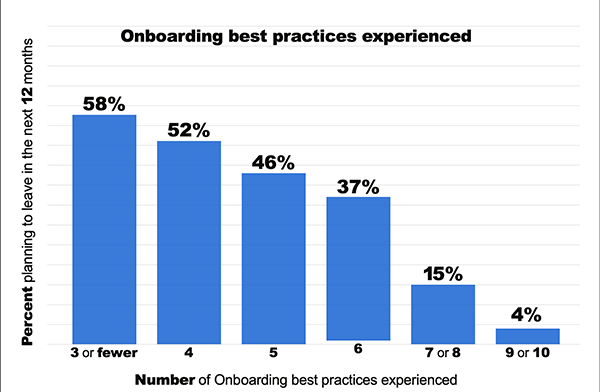On board with onboarding
Written by: Amy Stern, Managing Director, Research and Strategy, BI WORLDWIDE; Gina Brummels, Sr. Director of Learning, Talent and Change Management
(View Author Bio)
A consistent and more robust onboarding program will reduce first year turnover, decrease time to be productive and increase new hire engagement.
Now more than ever, are you ensuring your new hires feel supported from day one?
Here are some strategies to deliver effective onboarding for your employees.

____________________
Research suggests organizations with a strong onboarding process retain new hires at an 82% higher rate.
____________________
How did you feel on the first day at your first job?
Employees rarely remember what they learned on their first day – but they do remember how they felt. New hires who receive meaningful recognition are 4.6x more likely to feel inspired and inspired new hires are 3.3x more likely to stay at their organization.
In their recent Global Employee Experience Benchmarking study, the BIW Insights Lab surveyed 2,140 employees across 18 countries from organizations with at least 1,000 associates. Their findings showed how to better understand the current work experience, how to make it better for employees and how to create better outcomes for employers.
Comparing the experiences of those planning to stay versus those who were not, they were able to identify certain onboarding experiences that increase the likelihood of staying:
-
Building excitement for Day 1
-
Introducing them to others
-
Teaching about the job on Day 1
-
Keeping Day 1 active
-
Providing a challenge
-
Supporting mistakes
-
Showing them their future
-
Connecting them to the purpose

These onboarding practices lead to drastically lower intent to leave:
58% of those who experienced three or fewer of these onboarding practices plan to leave in the next year. The more experiences, the more that figure declines – down to just 4% of employees who experienced nine or ten of these best practices.
Getting employees on board with your company’s culture is not only beneficial to the employee – it can save you time and money in terms of training.
So, what contributes to a good onboarding experience? Here are three ideas to put into action.
1. Recognition inspires connection.
New hires who are reminded of how their presence impacts the mission of their company are 2.1x more likely to want to stay.
Recognition facilitates connection with others, support, promise of career growth and connection to purpose. Both team and individual recognition impact the likelihood to stay (2.3 and 2.1x, respectively).
When celebrating your new hires, ask what they would need to be successful instead of simply anticipating. People want to be seen, and sometimes the best way to see them is to communicate with them. You can do this by building out personas for each of the roles in your organization and asking yourself, “What would I need to succeed if I were in this person’s position?” Surveying these populations and empathizing with their feelings and needs leads to more targeted recognition. The more personalized, the better – employees who feel like their managers understand them are 5.7x more likely to feel inspired at work.
2. Celebrate your employees’ milestones – big and small, early and often.
Only 53% of new hires had their 1- or 3-year anniversaries celebrated.
Those who did are half as likely to have recently searched for new jobs.
For many positions, it may also be appropriate to recognize 30 days, 90 days or 6 months – reminding employees of their value and where they are on their journey.
You can supplement the experience with points, emails, celebrations on your recognition platform or gifts shipped to their home. In addition, to make it easier on managers, you can automate this process so your employees automatically receive notifications when it’s time to recognize their teammate.
3. Early connection leads to long-term engagement.
It’s important to weave your organization’s mission, vision and values from the start, so your team members can feel connected from day 1.
You can do this through pre-boarding or onboarding kits, having the team welcome the new employee or recognizing the new employee.
Another way to ensure employees feel connected from day 1 is by having a designated onboarding buddy. These buddies can support new team members and help train and mentor them. They can also clarify tasks and roles and provide a safe place for the new hire to ask questions. By building connections early on, a new hire is more likely to feel a connection to the company as well.
The following best practices can help you develop your onboarding strategy:
-
Define your audience and get to know them
-
Leverage and learn from external best practices
-
Determine your process and outcomes before deciding how to implement them
-
Get feedback along the way
____________________
Just as an employee’s experience at a company is a journey, so is the process of supporting them. Make sure you are constantly auditing and reworking your process to meet the changing needs of your workforce. Feeling supported from the first day can inspire a long-term connection with your company and lower onboarding and training costs for your company, all great reasons to design the experience to be employee-centered from day one.
____________________
The best way to get started is to get in touch.



















